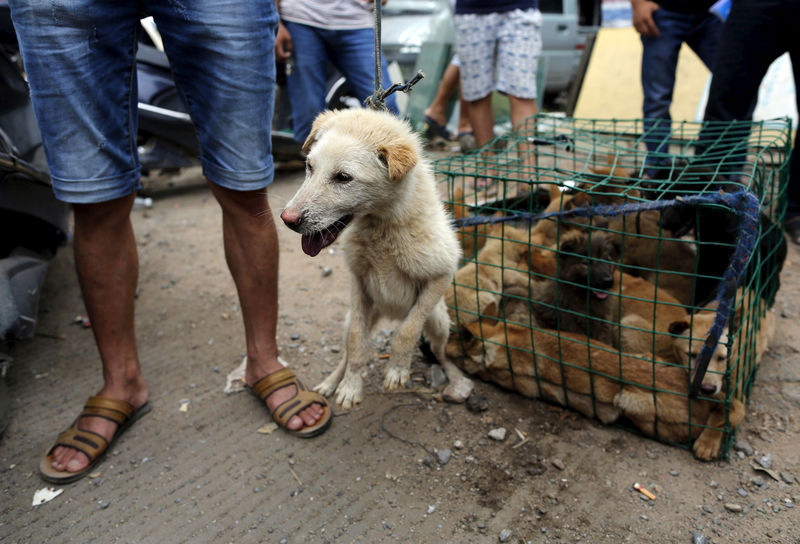By Christian Shepherd and Michael Martina
BEIJING (Reuters) - Some international non-governmental organisations (NGOs) in China are suspending operations, cancelling events and losing partnerships in the country six months after the government introduced a law requiring them to register with the police.
To register, the groups must first approach a government ministry from a provided list and ask it to become a "supervisory body" that will vet financial and operational details of the NGO’s work before filing them with the Ministry of Public Security.
Beijing says the law boosts Chinese state support for foreign NGOs and only need worry a handful of illegal groups whose political and religious work harms China's national security.
But the majority of the dozen NGOs approached by Reuters for this article say the law, which came in on Jan 1, has been a bureaucratic nightmare and appears to be aimed at making it more difficult for them to operate in China. Some NGOs say the ministries are often reluctant to take on the sponsor's role.
When foreign NGOs limit their operations in China it can not only curb the direct flow of funds into projects but can also hurt their Chinese non-profit partners. Many of these partnerships have been instrumental in establishing building blocks of modern Chinese society in areas such as education and healthcare.
DOG RESCUE
The law is already preventing foreign NGOs from doing some of their previous activities.
Humane Society International (HSI), the animal welfare activist group, was unable to attend the annual Yulin dog meat festival to rescue dogs from being killed and eaten this year, according to its Director of International Media, Wendy Higgins.
"We are trying to meet the criteria, but until we receive formal approval we have not been able to have HSI personnel on the ground as before and our funding to our partner groups is temporarily frozen," she said in an email.
The Washington, D.C.-based National Geographic Society has said it cannot accept applications for grants to do research, conservation or exploration projects in mainland China or from Chinese applicants due to the new law, according to an email from the organisation reviewed by Reuters. The email did not elaborate and National Geographic declined to comment.
Germany's Stiftung Asienhaus, an NGO that runs regular exchanges between European and Chinese NGOs, has seen applications from NGOs in China cut in half since the law took effect, according to Nora Sausmikat, head of its China programme.
"Bureaucratic hurdles, which have never been easily managed in China, have now become nearly insurmountable," she said.
Many other NGOs approached for this article either declined to be interviewed or to be identified for fear that they would upset the Chinese authorities and damage their registration prospects.
The Ministry of Public Security did not reply to a faxed request for comment. China's Foreign Ministry did not immediately respond to a request for comment.
"HOT POTATO"
The Chinese government estimates there are around 7,000 overseas NGOs in mainland China; academics who have studied the sector suggest about 1,000 of these have a permanent presence in China and so need to register.
According to the Ministry of Public Security database, only 139 representative offices of foreign NGOs have been registered so far.
Among the handful of groups registered who are working in more sensitive fields such as policy advocacy or the environment, are well-known groups with Chinese government ties, such as the Bill and Melinda Gates Foundation, set up by the Microsoft Corp (NASDAQ:MSFT) founder and his wife.
All the NGOs with offices in mainland China who were contacted by Reuters are attempting to register. Those who do not have offices hope to continue working using a system of temporary permits applied for by a Chinese partner.
Finding and securing a "professional supervisory unit" willing to sponsor an NGO's application is a stumbling block for NGOs seeking to register, according to four employees from separate NGOs.
"We are passed back and forth ... like a hot potato. No one wants to take the imitative," said one employee at an NGO that works in the education field.
The reticence of ministries to act as sponsors is likely due to fear of being held responsible for the actions of NGOs, said Lester Ross, a partner at the U.S.-based WilmerHale law firm, who advises a number of foreign NGOs in China.
"What is the advantage for them (the ministries)? Why stick your neck out?" he said.
But according to Sun Jiangang, a lawyer at the JunHe law firm in Shanghai who previously worked with the Shanghai Public Security Bureau, holdups are because local officials and NGOs need time to familiarise themselves with the new process.

INDEFINITE HOLD
A Western conservation organisation, which has operated in China for more than a decade, has put work on indefinite hold as its researchers are not being approved to enter Chinese national forestry reserves to study endangered species, an employee told Reuters.
“They want to strictly control who studies what and what results they get from reserves,” said this person, who asked that the group not be named. “The overall environment is unwelcoming."